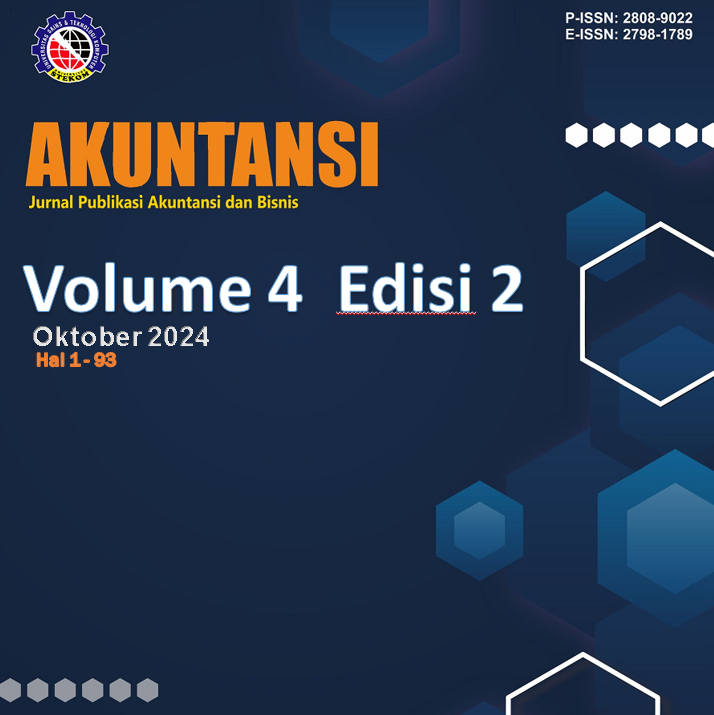MANAJEMEN LABA PADA PERUSAHAAN KELUARGA BIDANG MANUFAKTUR
DOI:
https://doi.org/10.51903/jiab.v4i2.819Kata Kunci:
Earnings Management, Family Control, Family CompanyAbstrak
Most companies in Indonesia are managed by family business groups. Family businesses provide opportunities for owners who own majority shares to control the company and influence management in the decision-making process, including gaining personal benefits through earnings management practices. The purpose of this study was to prove the effect of family control on earnings management actions in the manufacturing industry. Sample selection was based on the purposive sampling method. The sample used in this study was family companies in the manufacturing industry listed on the Indonesia Stock Exchange for the 2017-2019 period totaling 477 companies, but the samples that met the criteria were 298 companies. The data were processed and analyzed using multiple regression methods. The results of this study include, the independent variables, namely family ownership and family members, do not affect earnings management actions, while the control variable, namely leverage, has a negative and significant effect on earnings management, and company size does not affect earnings management
Referensi
Alqatamin, R. M., Aribi, Z. A., & Arun, T. (2017). The effect of the CEO’s characteristics on EM: Evidence from Jordan. International Journal of Accounting and Information Management, 25(3), 356–375. https://doi.org/10.1108/IJAIM-10-2016-0099
Anderson, R. C., & Reeb, D. M. (2003). Founding-Family Ownership and Firm Performance: Evidence from the S&P 500. Journal of Finance, 58(3), 1301–1327. https://doi.org/10.1111/1540-6261.00567
Anderson, R. C., & Reeb, D. M. (2004). Founding-Family Ownership, Corporate Diversification, and Firm Leverage. Journal of Law and Economics, 46(2), 653–684. https://doi.org/10.1086/377115
Cahyani, K. A., & Sanjaya, I. P. S. (2014). Analisis Perbedaan Dividen pada Perusahaan Keluarga dan Non Keluarga Berdasarkan Kepemilikan. Modus, 26(2), 133–144.
Claessens, S., Djankov, S., & Lang, L. (2000). The Separation of Ownership and Control in East Asian Corporations. Journal of Financial Economics, 58(1–2), 81–112. https://doi.org/https://doi.org/10.1016/S0304-405X(00)00067-2
Copeland, R. M. (1968). Income Smoothing. Journal Of Accounting Research : Empirical Research in Accounting, 6, 101–116. https://doi.org/https://doi.org/10.2307/2490073
Deegan, C. M. (2007). Financial Accounting Theory:2nd Edition. (2nd ed.). Mc-Graw iHill.
Dewi, P. P., & Rego, C. M. C. (2018). Kompensasi Bonus , Kepemilikan Keluarga Dan Manajemen Laba. Jurnal Ilmiah Akuntansi, 3(1), 71–81.
Diyanti, V., Utama, S., Rossieta, H., & Veronica, S. (2013). Pengaruh Kepemilikan Pengendali Akhir, Kepemilikan Keluarga serta Praktek Corporate Governance Terhadap Transaksi Pihak Berelasi dan Kualitas Laba. Simposium Nasional Akuntansi XVI, I(March 2019), 213–247.
Fan, J. P. H., & Wong, T. J. (2002). Corporate Ownership Structure and The Informativeness of Accounting Earnings in East Asia. Accounting and Business Research, 32(4), 401–425. https://doi.org/10.1080/00014788.2002.9728973
Fatma, K. Z., & Agustia, D. (2019). The influence of family control and institutional ownership of profit management. International Journal of Innovation, Creativity and Change, 9(8), 93–107.
González, M., Guzmán, A., Pombo, C., & Trujillo, M. A. (2014). Family Involvement and Dividend Policy in Closely Held Firms. Family Business Review, 27(4), 365–385. https://doi.org/10.1177/0894486514538448
Gramling, A. A., & Stone, D. A. (2001). Audit Firm Industry Expertise : A Review and Synthesis of The Archival Literature. Accounting Literature, 20, 1–29.
Hu, Y., Wang, D., & Zhang, S. (2007). Founding Family Ownership , Management and Payout Policy. ResearchGate. https://www.researchgate.net/publication/228440858_Founding_family_ownership_management_and_payout_policy
Jaggi, B., Leung, S., & Gul, F. (2009). Family control, board independence and earnings management: Evidence based on Hong Kong firms. Journal of Accounting and Public Policy, 28(4), 281–300.
Jensen, M. C., & Meckling, W. H. (1976). Theory of the firm: Managerial behavior, agency costs and ownership structure. Journal of Financial Economics, 3(4), 305–360. https://doi.org/10.4159/9780674274051-006
Jiraporn, P., & DaDalt, P. J. (2009). Does Founding Family Control Affect Earnings Management? (Vol.16 issue 2; SSRN Working Paper).
KNKG. (2006). Pedoman Umum Good Corporate Governance Indonesia. https://www.researchgate.net/publication/269107473_What_is_governance/link/548173090cf22525dcb61443/download%0Ahttp://www.econ.upf.edu/~reynal/Civil wars_12December2010.pdf%0Ahttps://think-asia.org/handle/11540/8282%0Ahttps://www.jstor.org/stable/41857625
Lestari, G. M. I., & Harindahyani, S. (2017). Pengaruh Perusahaan Keluarga Dan Peran Komisaris Independen Terhadap Praktik Manajemen Laba Di Indonesia. Akuntansi Dan Teknologi Informasi, 11(1). https://doi.org/10.24123/jati.v11i1.271
Margono, A. S., Tanujaya, Y. I., Hidayat, A. A., & Yuliati, R. (2020). Pengaruh Kontrol Keluarga Terhadap Manajemen Laba. Jurnal Akuntansi, 8(2), 239–250. https://doi.org/10.46806/ja.v8i2.622
Rezeki, S. (2015). Pengaruh Kepemilikan Keluarga, Praktek Good Corporate Governance, Profitabilitas Terhadap Manajemen Laba Pada Perusahaan Listing di Bursa Efek Indonesia 2008-2012. Jurnal Online Mahasiswa Fakultas Ekonomi Universitas Riau, 2(1), 34120.
Scott, W. (2009). Financial Accounting Theory : 3rd Edition. Prentice Hall.
Setianto, R. H., & Sari, P. K. (2017). Perusahaan Keluarga dan Kebijakan Dividen di Indonesia. Jurnal Siasat Bisnis, 21(2), 107–118. https://doi.org/10.20885/jsb.vol21.iss2.art1
Wang, D. (2006). Founding family ownership and earnings quality. Journal of Accounting Research, 44(3), 619–656. https://doi.org/10.1111/j.1475-679X.2006.00213.x
Wijayanti, L. (2014). Pengaruh Kontrol Keluarga dan Komisaris Independen terhadap Kebijakan Dividen dan Struktur Modal pada Perusahaan yang terdaftar di BEI. Ekonomi Dan Bisnis, 1, 81–89. https://www.researchgate.net/publication/269107473_What_is_governance/link/548173090cf22525dcb61443/download%0Ahttp://www.econ.upf.edu/~reynal/Civil wars_12December2010.pdf%0Ahttps://think-asia.org/handle/11540/8282%0Ahttps://www.jstor.org/stable/41857625
Young, M. N., Peng, M. W., Ahlstrom, D., Bruton, G. D., & Jiang, Y. (2008). Corporate Governance in Emerging Economies: A Review of the Principal–Principal Perspective. Journal of Management Studies, 45(1), 196–220. https://doi.org/https://doi.org/10.1111/j.1467-6486.2007.00752.x
Zhong, K., Gribbin, D. W., & Zheng, X. (2007). The Effect of Monitoring by Outside Blockholders on Earnings Management. Quarterly Journal of Business and Economics, 46(1), 37–60. https://doi.org/10.2307/40473429






